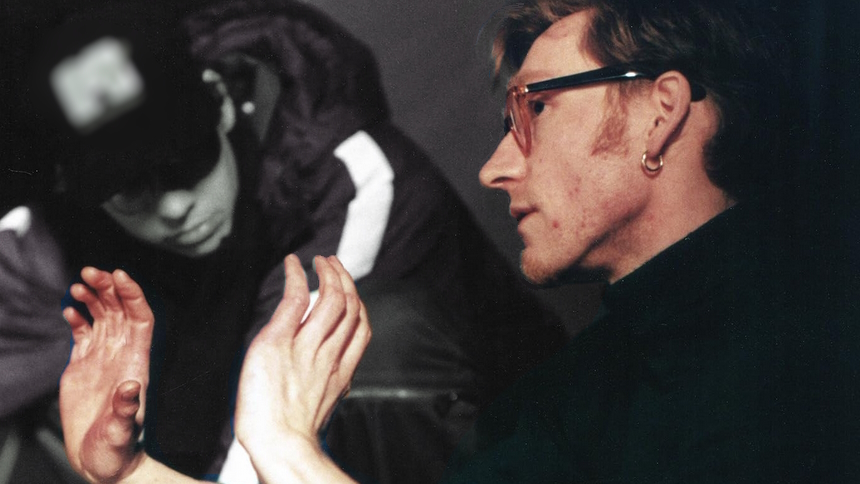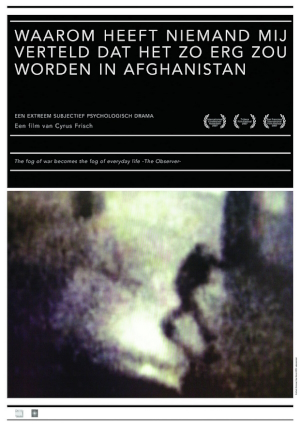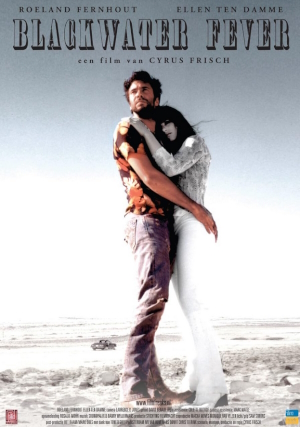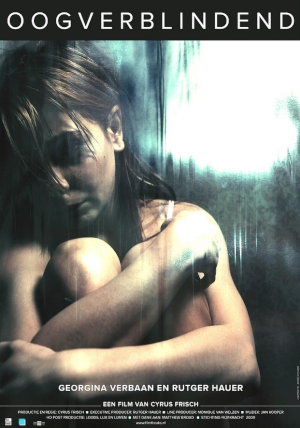Now Streaming: The Unavoidable Cinema Of Cyrus Frisch

The films Dutch director Cyrus Frisch has made thus far are controversial, erratic and politically engaged. With the recent re-release of his films Dazzle (original title: Oogverblindend), Blackwater Fever, and Why Didn't Anybody Tell Me It Would Become This Bad in Afghanistan on Vimeo On Demand, it is a good time to get (re-)acquainted with his work.
After a number of short films and television programs with which he made a name for himself, he made his feature film debut in 2001 with Forgive Me. Forgive Me is one of the most challenging films I have seen recently. But like any of Frisch's films, it invites you to look deeper. In Forgive Me, Frisch deliberately pushes the boundaries of what is acceptable. He was alarmed by increasingly exploitative and vulgar entertainment in the media, such as the rise of reality television, and decided to make it clear in his film where the boundaries are, by crossing them completely.
Together with a core set of four actors, Nico, Peter, Achmed and Chiquita, and some supporting players, playing magnified versions of themselves, Frisch created a stage performance (Jezus/Liefhebber) and a film, Forgive Me, which are intertwined as works. These are films where he plays into the stereotypes and prejudices surrounding these people. After all, Nico, Peter, Achmed and Chiquita are people who fall out of step with society: addicted to alcohol or drugs, or not accepted for other reasons.
The way they were portrayed in the press at the time stung the actors, something that is also depicted in the film, so I'll try to choose my words carefully. What Cyrus Frisch does in Forgive Me, however, is deliberately push the boundaries of how these people are normally treated by reality shows and take it a step further. For example, in the very first scenes Nico wets his pants and later there is a scene in which Chiquita slowly drools on her clothes while intoxicated, in front of a theater audience of laughing spectators. Frisch plays an exaggerated version of himself, a diabolical director pushing his actors to their extremes.
It is easy to accuse Frisch of exploitation. However, there is also a change in context that makes Forgive Me interesting. It feels dirty when a smiling audience watches Chiquita, Nico, Peter and Achmed in degrading situations. But having this form of schadenfreude taking place in a theater rather than a cheap TLC-program really highlights the core of the problem. Maybe Frisch seems to have no compassion, but the audience has even less. Even on the spot, without the distance created by the television screen, it proves eerily easy to see the suffering of others as a source of entertainment. The change of context brings to mind the work of Dutch contemporary artist TINKEBELL, who, for example, called attention to the way we treat animals by killing her own sickly cat and turning him into a handbag. In the Dutch parliament, questions were raised about the art project (not entirely unjustifiably, in my opinion). In the case of Forgive Me, there is a similar button pushing of what is acceptable, but according to the images we see in the film itself it hardly evoked any indignation.
That is extra painful, in this case, cause we are dealing with other human beings being treated lesser than. Apparently, we are so used to people we see as different being exploited in the media that it doesn't cause a furor anymore. Frisch makes his audience complicit, but the press even more so. Chiquita complains later in the film and the epilogue included on the Dutch home video release, that the way the press talked about the actors, hurt in particular. That the journalists of the Netherlands praised the short film [No Title] with the same protagonists, which ran at the International Documentary Film Festival (IDFA) -- but meanwhile dismissed the actors as irresponsible junkies and drunks -- is indeed painful. The film is about exploitation too, but in my view it is ultimately not exploitation itself. Frisch incorporates too many contradictions and nuances into his film for that to be the case. Forgive Me veers between immorality and moralism.
It is precisely these constantly shifting qualities that make Forgive Me a film that is not easily ignored. It is a film that makes you angry, but also forces the viewer to wonder where that anger comes from. Aren't you exactly like the Dutch press at the time, who declared Chiquita and company insane? Pawns in Frisch's diabolical game? The question that also arises while watching: if the director is an egotistical asshole, exploiting his cast and crew for what is essentially a thought experiment, why on earth would he portray himself this way in his own film? Isn't making yourself the villain precisely an example of a lack of ego?
When I told Frisch in an e-mail exchange that Forgive Me made me really angry, he informed me that during editing (together with editor Sander Vos), he looked for precisely these contradictions. Angering and upsetting the audience was also a goal. He took the sting out of the film for me, by reassuring me about the roles of Nico, Peter, Achmed and Chiquita. But that, in retrospect, is what makes Forgive Me so well made and disturbing. You can't avoid it. You can't look away. And that's a theme in all of Frisch's other films.
 Why Didn't Anybody Tell Me It Would Become This Bad in Afghanistan (2007), Frisch's subsequent film, is the first ever feature shot on a cell phone. The image is purposefully pixelated and difficult to "read". That means we also have to observe more closely here, as with Forgive Me, though in a different way. The protagonist of Why Didn't Anybody, an Afghanistan veteran played by Frisch himself, films everyday images on his cell phone while he himself slowly loses his mind. The veteran is getting increasingly unnerved by society, and slowly transforms from a spectator on the sidelines to someone fed-up with society, who will act on his dissatisfaction. By being observers of his roughly assembled footage, we are placed in his shoes and witness to his decline. The effect of the grainy image quality is that everything becomes ominous. Among other things, Frisch, and therefore his character, shoots footage of loitering youths from his balcony, and you can't quite make out what they are doing because of the murky images.
Why Didn't Anybody Tell Me It Would Become This Bad in Afghanistan (2007), Frisch's subsequent film, is the first ever feature shot on a cell phone. The image is purposefully pixelated and difficult to "read". That means we also have to observe more closely here, as with Forgive Me, though in a different way. The protagonist of Why Didn't Anybody, an Afghanistan veteran played by Frisch himself, films everyday images on his cell phone while he himself slowly loses his mind. The veteran is getting increasingly unnerved by society, and slowly transforms from a spectator on the sidelines to someone fed-up with society, who will act on his dissatisfaction. By being observers of his roughly assembled footage, we are placed in his shoes and witness to his decline. The effect of the grainy image quality is that everything becomes ominous. Among other things, Frisch, and therefore his character, shoots footage of loitering youths from his balcony, and you can't quite make out what they are doing because of the murky images.
Why Didn't Anybody thus immerses you in the paranoid mindset of the protagonist, where everything is hazardous and unpredictable. Multidimensional too, as Frisch once again seeks contradictions and nuance. The story remains ambiguous, until the explosive end.
Again, Frisch pushes boundaries: in the epilogue of Forgive Me, Chiquita says that she is bothered by the end result of the film, but that she participated in it on her own behalf, willingly. The question in Why Didn't Anybody, however, is to what extent the people being filmed are aware that they are being filmed. That nagging ethical question makes the film linger.
The film stays in your mind partly because the film's theme is to not look away. The protagonist in Why Didn't Anybody perhaps doesn't see clearly anymore, but, the film suggests, perhaps he is one of the few people who really looks closely, and might see the truth. A person who sees the cracks in society, and who is completely disturbed by them. Who "steals pictures" with his cell phone of loitering youths and homeless people and a "troublemaker" in the local supermarket, but who does not, like many people, look away, but instead zooms in.
 In Frisch's next film, Blackwater Fever (2008), too, it is difficult for the viewer to see what is really happening because the protagonist, played by Roeland Fernhout, is believed to be suffering from the titular disease, a form of malaria. Many of the shots are out of focus, or filmed in reflective surfaces, so you don't really get to see what is happening directly. Feverish, in other words. It delivers a haptic sensory experience that puts us once again in the protagonist's shoes. He is a Western white man travelling across America with a woman (Ellen ten Damme). Slowly and gradually, almost unnoticed even, however, the landscape transforms into the Horn of Africa, and their surroundings turn increasingly barren and grim.
In Frisch's next film, Blackwater Fever (2008), too, it is difficult for the viewer to see what is really happening because the protagonist, played by Roeland Fernhout, is believed to be suffering from the titular disease, a form of malaria. Many of the shots are out of focus, or filmed in reflective surfaces, so you don't really get to see what is happening directly. Feverish, in other words. It delivers a haptic sensory experience that puts us once again in the protagonist's shoes. He is a Western white man travelling across America with a woman (Ellen ten Damme). Slowly and gradually, almost unnoticed even, however, the landscape transforms into the Horn of Africa, and their surroundings turn increasingly barren and grim.
The man doesn't notice anything, averts his eyes from all the suffering, the war and the famine and the violence, even as the woman is raped (out of focus) in the background. The changes in context and shifts in meaning that Frisch loves to play with, with the theatrical setting in Forgive Me or the paranoid pixels of Why Didn't Anybody, are here in full force. Only in the final scene does the man open his eyes to suffering, when he is confronted by a number of starving people who were left behind in an emptied village.
Blackwater Fever can be thematically linked to the final scenes of Forgive Me. In those scenes, a break in style occurs when the film is interrupted for a scene in which Ellen ten Damme is walking around on the beach and suddenly finds herself in a war setting, in which Achmed also plays a role. Faced with the world's suffering, she decides to put Achmed out of his misery. Blackwater Fever is essentially a feature-length elaboration of these scenes, including the casting of Ellen ten Damme.
During the closing scenes of Blackwater Fever, I was reminded of Kevin Carter's famous photograph in which a vulture approaches a gaunt little boy, Kong Nyong (although the photograph is called The Vulture and the Little Girl). Carter eventually committed suicide, partly because of all the suffering he had seen and where, as a photographer, he did not want or dare to intervene. The question is: Did he look away by doing nothing? Or did he look deeper than most people, by taking the photograph, and sharing it with us? These are questions that underlie all of Cyrus Frisch's work. Blackwater Fever is haptic and hallucinatory, Frisch's strongest film to date. Though thematically his least jagged and complex film, the relative straightforwardness here is an advantage, not a disadvantage.
 Dazzle is seen by the Dutch press as Frisch's most accessible film. I disagree. I think Blackwater Fever, despite its intense subject matter and images, is the closest thing to a traditional arthouse film in Frisch's catalog. Dazzle, despite the casting of Georgina Verbaan and Rutger Hauer, is stylistically and thematically a film in keeping with Why Didn't Anybody. If Blackwater Fever and Forgive Me can be linked thematically and visually, through the final scene of Forgive Me in particular, then Dazzle and Why Didn't Anybody also form a pair. Again, there are multiple "stolen shots" from the window of an apartment. Again, we follow a lonely soul who cannot cope with the state of the world. And again, there is a dissonance between image and narrative, with some of the images not seeming to connect directly to the story.
Dazzle is seen by the Dutch press as Frisch's most accessible film. I disagree. I think Blackwater Fever, despite its intense subject matter and images, is the closest thing to a traditional arthouse film in Frisch's catalog. Dazzle, despite the casting of Georgina Verbaan and Rutger Hauer, is stylistically and thematically a film in keeping with Why Didn't Anybody. If Blackwater Fever and Forgive Me can be linked thematically and visually, through the final scene of Forgive Me in particular, then Dazzle and Why Didn't Anybody also form a pair. Again, there are multiple "stolen shots" from the window of an apartment. Again, we follow a lonely soul who cannot cope with the state of the world. And again, there is a dissonance between image and narrative, with some of the images not seeming to connect directly to the story.
We see Georgina Verbaan, one of the Netherlands' best actors. She plays a woman who locks herself into a friend's apartment. A man calls her, as played by Rutger Hauer, and together they wax philosophical about the world's woes. Where Blackwater Fever takes place largely in silence, Dazzle relies entirely on the dialogue between Verbaan and Hauer. They grow closer during the conversation, until unspoken tensions surface.
The shifting signifiers that are often present in the works of Frisch here are mainly in the discrepancy between the images we see and the words we hear. As with the pixel soup in Why Didn't Anybody, we are asked to interpret and make connections ourselves. The ambiguity, however, yields, when Frisch delivers an unflinching message to the Royal House of the Netherlands toward the end. Indeed, the film deals directly with the regime of Jorge Rafael Videla in Argentina, where Jorge Zorreguieta, the father of current Dutch Queen Máxima, was minister of agriculture. He was a top political figure during the many atrocities directed against civilians, including the murder of an estimated 10,000 to 30,000 of them, even though he always denied knowing the extent to which the regime was oppressing its people.
Frisch's message is clear: those who do nothing against those who perform evil are complicit in evil. To look away is to participate. Frisch is averse to those who try to wash away their guilt. His art forces us to look deeper, and the power of his films is the frustration of not being able to do anything. After all, the film is already in the can. You watch along with the man in Blackwater Fever, the veteran in Why Didn't Anybody, as they watch helplessly or commit an act of desperation. You are a spectator as the director humiliates his actors in Forgive Me. You listen in on the phone callers in Dazzle, while they have an intimate and haunting conversation. "Do something!", you want to scream. "Do something yourself!", the films shout back.
Three of the films discussed, Dazzle, Why Didn't Anybody Tell Me It Would Become This Bad in Afghanistan and Blackwater Fever, can be rented on the Vimeo On Demand-page of Cyrus Frisch.







